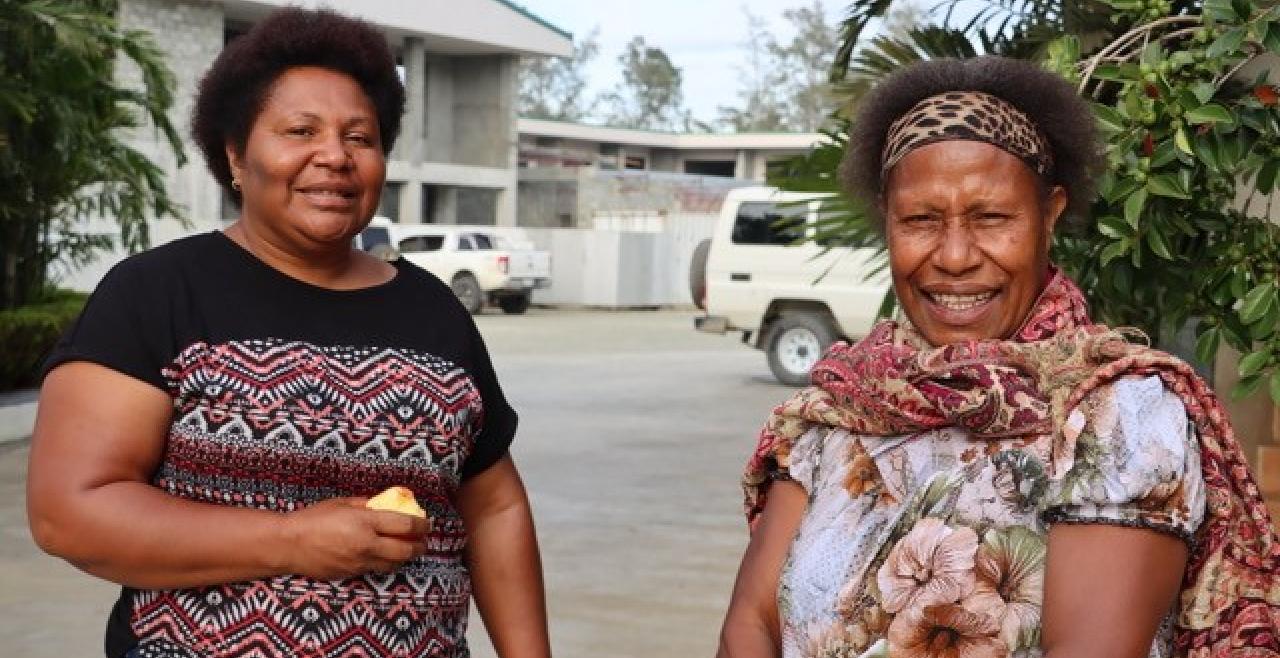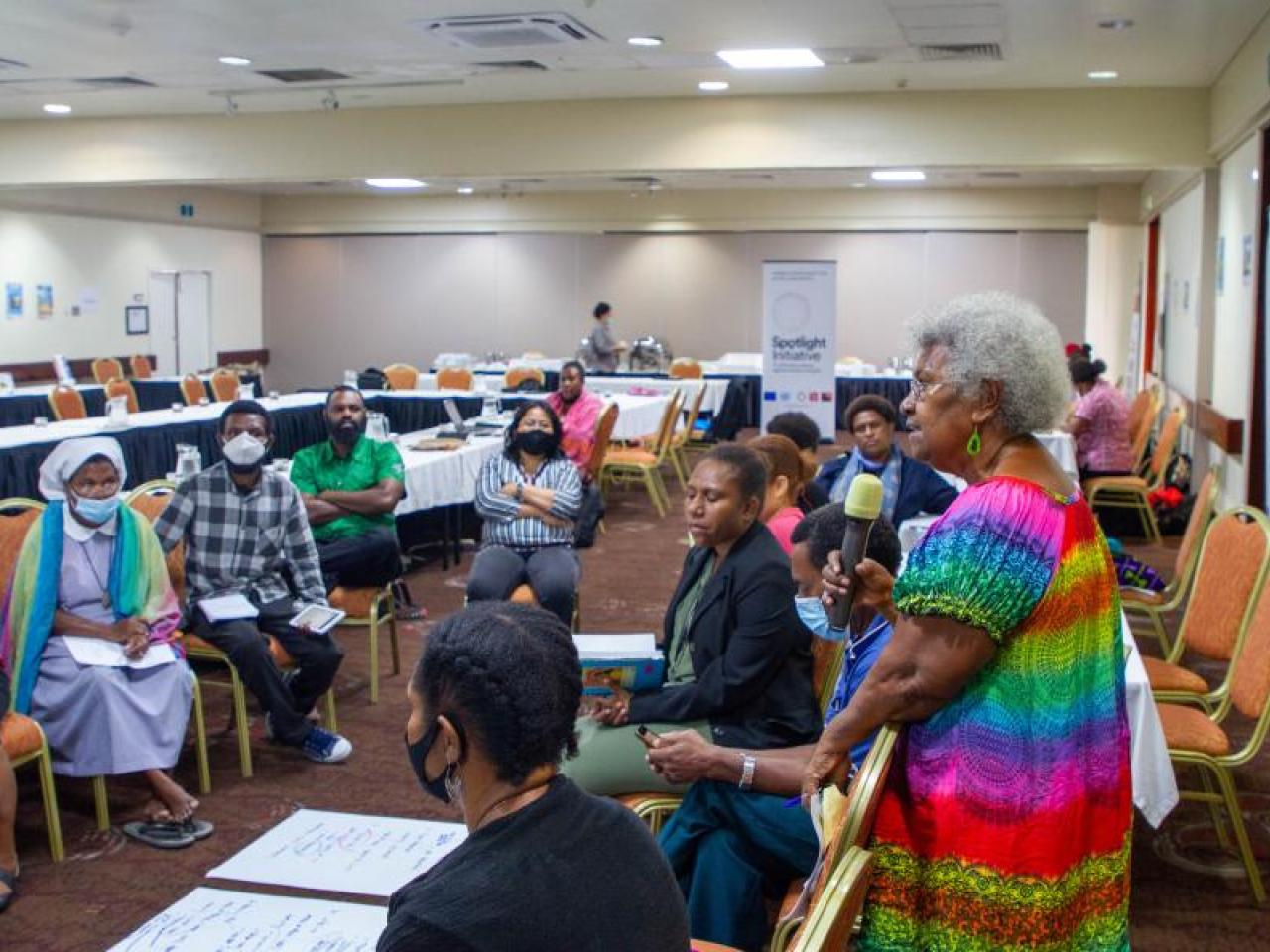"It's going to protect our lives" - In Papua New Guinea, human rights defenders welcome draft protection bill

HIGHLANDS REGION, Papua New Guinea - “When we are trying to help others or when we go to court to take up someone’s case, we face threats and intimidation,” shares Highlands Human Rights Defenders Network’s Mary Kini. For more than 14 years, she’s been working to assist victims of sorcery-related violence (SARV) and gender-based violence (GBV) in Papua New Guinea, despite the high personal cost that often comes with it.
“It is very important that we have a protection bill because it’s going to protect our lives,” she says.
Above: Human rights defenders and sorcery accusation survivors explain why better protections are so essential.
Ms. Kini recently joined fellow human rights defenders Eriko Fuferefa (Kafe Urban Settlers Women’s Association) and Angela Apa (Kup Women for Peace) in Mt. Hagen for a three-day consultation on the development of a Human Rights Defenders Protection bill.
The consultation, held in partnership with the Spotlight Initiative and the Constitution and Law Reform Commission, was the first of four that took place in March across the country to progress legislation that better protects human rights defenders from retaliation or intimidation in the course of their work. Human rights defenders are often targeted when they assist a survivor of sorcery accusation-related violence because they are seen as interfering in a customary practice, or when they help GBV survivors to move provinces as they are considered to be meddling in a family matter.
“We really need to be protected because for so many years we have not been protected and some human rights defenders have been killed along the way,” said Ms. Fuferefa. “Some of them are abused, tortured. We have so many bruises.”
Ms. Kini is also a co-chair of the Civil Society Reference Group (CSRG), a core part of implementation of the Spotlight Initiative to end violence against women and girls in Papua New Guinea. The Spotlight Initiative has provided technical support to the Special Parliamentary Committee on Gender-Based Violence, which completed a second public inquiry into gender-based violence in Papua New Guinea in March.
"Human rights defenders have been killed. Some of them are abused, tortured. We have so many bruises.” - Eriko Fuferefa, Kafe Urban Settlers Women’s Association
“As a CSRG co-chair and human rights defender, I would really like to acknowledge the Spotlight Initiative over these two years,” said Ms. Kini. “They created a platform where we can go and lobby and we can advocate at that level.”
“We are able to get into that space to talk about our issues down at the grassroots level and in the regions around the country.”
If successful, the draft bill will complement other human rights protections in Papua New Guinea.
Following high-level advocacy from the Spotlight Initiative through support to the Special Parliamentary Committee on Gender-Based Violence, there has been greater political ownership of issues of violence against women and children, demonstrated by the country’s first Special Parliamentary Inquiry on GBV, which delivered recommendations to parliament and has made notable legislative advances in the area of sorcery-accusation related violence.
This includes amendments to the Criminal Code to address the role of glasman and glasmeri in perpetuating sorcery accusation-related violence, and the role of the individuals or families who use them. Glasman and glasmeri are the people who make accusations of sorcery. Practices to identify “sorcerers” vary between districts, but generally, when someone has died unexpectedly, the family of the deceased will consult the glasman (male) or glasmeri (female) to identify who in the community is responsible. The amendments to the Criminal Code make it illegal to use, attempt to use, or threaten to use their services. Penalties include up to 10 years in jail and fines up to 10,000 PGK.
"This is something we have been asking for for a long, long time.” - Mary Kini, Highlands Human Rights Defenders Network
Accusations of sorcery by a glasman or glasmeri have led to the torture and murder of dozens of women across Papua New Guinea. While sorcery accusations can be levelled at both men and women, most of the victims of violence are women.
"When [my husband] died, we took him to his village and there, his family began to suspect that I killed him, so they planned to cut off my head and bury me with my late husband," explains one SARV survivor. "It wasn’t true, they just wanted to kill me."
According to figures reported in the Post Courier in January, an average of 388 cases of sorcery accusation-related violence are reported across four Highlands provinces every year, but fear of retaliation means the true number of victims is likely far higher. Since 2001, 64 cases have been brought before the national court. Indicative of the large number of perpetrators in sorcery-accusation related incidents, 30 cases included more than one defendant and one notable case included 97 defendants. Of the 245 people charged since 2001, 225 were convicted. This means that when perpetrators are arrested and brought before a court, conviction rates are high.
“People have these norms, these beliefs,” said Ms. Kini. “When a glasman or glasmeri comes along and says something, people automatically react to what these glasman or glasmeri are saying. They are provocative.”
In submissions to the Special Parliamentary Inquiry in 2021, the Spotlight Civil Society Reference Group (of which Ms. Kini is a co-chair) recommended that the government review policies and the implementation of laws that address social norms that allow for SARV, including the use of glasman and glasmeri.
“This is very important and I am really pleased that this is passed as this is something we have been asking for for a long, long time,” concluded Ms. Kini.
By Rachel Donovan

